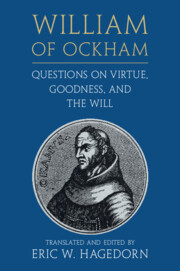
-
Select format
-
- Publisher:
- Cambridge University Press
- Publication date:
- May 2021
- May 2021
- ISBN:
- 9781108670036
- 9781108498388
- 9781108735773
- Dimensions:
- (228 x 152 mm)
- Weight & Pages:
- 0.68kg, 374 Pages
- Dimensions:
- (229 x 152 mm)
- Weight & Pages:
- 0.55kg, 374 Pages
- Collection:
- Other Cambridge Editions
You may already have access via personal or institutional login- Collection:
- Other Cambridge Editions
Book description
William of Ockham (d. 1347) was among the most influential and the most notorious thinkers of the late Middle Ages. In the twenty-seven questions translated in this volume, most never before published in English, he considers a host of theological and philosophical issues, including the nature of virtue and vice, the relationship between the intellect and the will, the scope of human freedom, the possibility of God's creating a better world, the role of love and hatred in practical reasoning, whether God could command someone to do wrong, and more. In answering these questions, Ockham critically engages with the ethical thought of such predecessors as Aristotle, Augustine, Thomas Aquinas, and John Duns Scotus. Students and scholars of both philosophy and historical theology will appreciate the accessible translations and ample explanatory notes on the text.
Reviews
'There is solid value in this volume: hard reasoning about ethics from a master of tough thinking and a form of philosophy that works an idea from its ontological range to its casuistic range. These are set within a doctrine, nominalism, that had profound effects on all manner of intellectual conception and cultural production in the Renaissance. All this is collected here from sources that are very long and thorny into an exemplary compendium for ethics, logic, and philosophical method.'
Bennett Gilbert Source: Metascience
'This book is necessary for those interested in William of Ockham, medieval ethics, moral psychology, and the background to the Reformation.'
Thomas M. Osborne Source: Speculum
‘Hagedorn's book is a valuable tool, not only for teaching, but also for the study of Ockhamian moral theory. Done with the greatest care, there is no doubt that it opens the door to new research in the field and perhaps also to the revision of certain interpretative theses.’
Valentin Braekman Source: Archives de philosophie
Contents
Metrics
Altmetric attention score
Full text views
Full text views help Loading metrics...
Loading metrics...
* Views captured on Cambridge Core between #date#. This data will be updated every 24 hours.
Usage data cannot currently be displayed.
Accessibility standard: Unknown
Why this information is here
This section outlines the accessibility features of this content - including support for screen readers, full keyboard navigation and high-contrast display options. This may not be relevant for you.
Accessibility Information
Accessibility compliance for the PDF of this book is currently unknown and may be updated in the future.


